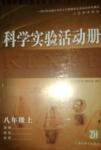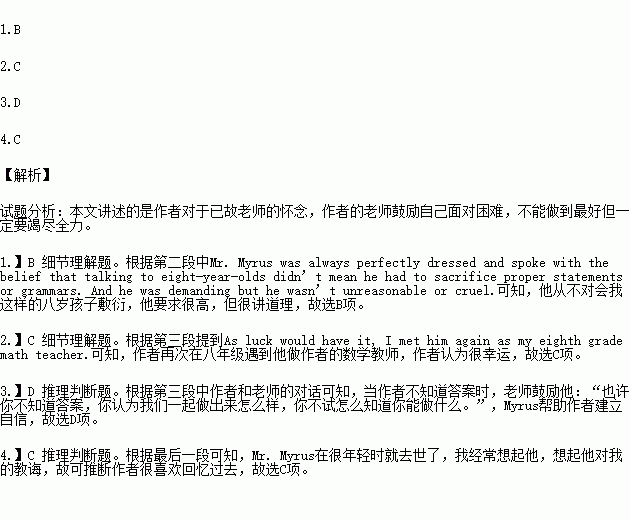题目内容
I believe you can do your best. Not being the best but toughing the limits of what you’re capable of. I gained this belief from my third grade teacher, the most special, honored, trustworthy, and loved person in my life.
Mr. Myrus was always perfectly dressed and spoke with the belief that talking to eight-year-olds didn’t mean he had to sacrifice proper statements or grammars. And he was demanding but he wasn’t unreasonable or cruel. He simply felt that no matter what your best was, you should achieve it.
As luck would have it, I met him again as my eighth grade math teacher. I was not, nor ever will be, gifted in math. I remember my struggles in class. “I don’t know the answer,” I would say, “I can’t do it!” “Perhaps you don’t know the answer,” he would say quietly. “Do you think we might figure it out together? How do you know what you can do until you try?”
Mr. Myrus lived around the corner, and I would often stop by to talk while he worked in his garden. I knew there was someone who let me know that if I had really tried, that was enough.
“Don’t be so hard on yourself,” he’d say. “Stop blaming yourself. Did you try your best? Well, then you’re not a failure,” he often told me these words.
Mr. Myrus died in 1978. I had never thought about his death. He was too young. I felt sorry. But when I think about him now, I don’t feel so sorry. He taught me to be kind, not only to others, but to myself. He taught me my own value. He taught me about honor, about truth, and about doing my best—and that all feelings and beliefs have dignity and deserve respect. And of all the things I know, this I believe: We can’t all be “the best”, but we can, each of us, be our best, and I know that’s true because Mr. Myrus told me that.
1.What can we know about Mr. Myrus according to the passage?
A. He usually treats his students in a hard way.
B. He is responsible for his teaching and students.
C. He is a person who isn’t particular about what he wears.
D. He sometimes is cruel and unreasonable to his students.
2.The author thought he was a lucky dog because ________.
A. he had got a great belief from his teacher
B. Mr. Myrus had taught him for eight years
C. Mr. Myrus became his teacher a second time
D. he developed a good relationship with Mr. Myrus
3.It can be concluded from the third paragraph that ________.
A. the author preferred other subjects to math
B. Mr. Myrus thought it was very easy to learn math
C. the author was ashamed to admit his math was poor
D. Mr. Myrus helped the author build up his confidence
4.What can we learn by reading the passage?
A. The author hoped to live a positive life.
B. The author may have become a teacher.
C. The author liked to recall his childhood.
D. The author ended up being a man of self-confidence.
 科学实验活动册系列答案
科学实验活动册系列答案
